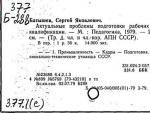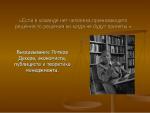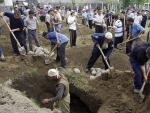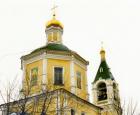What helped Krylov become a well-read, educated person. Interesting facts about Krylov
I.A. began in noisy and bustling Moscow, where the future fabulist writer was born on February 2 (13), 1769.
Krylov's childhood
Ivan Andreevich’s parents were forced to frequently move from one place to another. At the height of the peasant uprising led by Emelyan Pugachev, Krylov and his mother were in Orenburg, and the father of the future writer was a captain in the Yaitsky town itself. Krylov was even mentioned in Pugachev’s hanging list, but, fortunately for the family, it didn’t come to that. However, after some time, Andrei Krylov dies, and the family is left with practically no money. Ivan's mother is forced to work part-time in the houses of rich people. Krylov himself began to work in a very early age- from the age of nine. He was allowed to copy business papers for a small salary.
Then the boy received his education in the house of N. A. Lvov, famous writer. Ivan studied with the owner’s children, met with artists and writers who often came to visit Lvov, and listened to their conversations.
Due to some fragmentary education, the writer subsequently encountered many difficulties. However, over time, he managed to learn to write correctly, significantly expand his horizons and even master the Italian language.
First attempts at writing
A new stage began in the life of the future fabulist from the moment the family moved to St. Petersburg. The biography of I. A. Krylov during this period is especially interesting, because it was at this time that his first steps on the literary path took place. The fabulist’s mother went to the northern capital to resolve the pension issue, but her efforts were unsuccessful.
Krylov himself, without wasting any time, gets a job in the office of the Treasury Chamber. However, official matters do not bother him too much. Almost everything free time he spends on literary studies, visiting theaters, begins to communicate closely with talented famous actors, as well as with P. A. Soimonov, director of theaters.
Even after the death of his mother, Ivan's hobbies remain the same. Although now it is more difficult for the future fabulist: he must keep an eye on his younger brother, who remained in his care.
Biography of I. A. Krylov in the 80s. is a constant collaboration with the world of theater. During this period, librettos for the operas “Coffee Shop”, “Mad Family”, “Cleopatra”, as well as a comedy called “The Writer in the Hallway” came out from under his hand. Of course, they did not bring either fame or huge fees. But they allowed Krylov to join the literati of St. Petersburg.
The young man is taken under the protection of the popular playwright Knyazhin and strives to help Krylov more successfully promote his works. However, Ivan Andreevich himself not only refuses this help, but also ends any relationship with Prince, after which he writes the comedy “Pranksters,” in which he ridicules the playwright and his wife in every possible way. It is not at all strange that the comedy itself was banned from production, and the author ruined relations with both the writers and the theater management, thanks to whom the works were staged.
At the end of the decade, Krylov expressed a desire to try his hand at journalism. His songs were published in the magazine “Morning Hours” in 1788, but they also went unnoticed. After this, Ivan Andreevich decides to publish his magazine (“Spirit Mail”), which is published over eight months in 1789. “Spirit Mail” takes the form of correspondence fairy tale characters- dwarves and wizard. In it, the author presents a caricature of the society of that time. However, the magazine was soon closed by censorship, explaining that the publication had only 80 subscribers.
Since 1790, Krylov retired, after which he devoted himself entirely to literary activity. At this time, the biography of I. A. Krylov is closely intertwined with life paths the author's friends - A. Klushin, P. Plavilshchikov and I. Dmitriev. Ivan Andreevich runs the printing house and, together with his friends, begins to publish the magazine “Spectator” (later “St. Petersburg Mercury”). In 1793, the magazine was finally closed, and Krylov left the capital for several years.
In the service of Prince Golitsyn
Until 1797, Krylov lived in Moscow, and then began to travel around the country, staying at the houses and estates of his friends. The fabulist was constantly looking for sources of income, and for some time he found what he wanted in card games. By the way, Krylov was known as a very successful player, on the verge of cheating.
Prince Sergei Fedorovich Golitsyn, having met Ivan Andreevich, invited him to become his home teacher and personal secretary. Krylov lives on the prince’s estate in the Kyiv province and studies literature and languages with the sons of the aristocrat. Here he writes plays for production in the home theater, and also masters the skill of playing various musical instruments.
In 1801, Alexander I ascended the throne, who had great confidence in Golitsyn and appointed him governor-general of Livonia. Krylov, in turn, is given the position of ruler of the chancellery. Until 1803, the fabulist worked in Riga, and then moved to his brother in Serpukhov.
Creative glory

Krylov’s work and biography become especially interesting starting from this time. Indeed, during this period, for the first time, Krylov’s play (“Pie”) won the hearts of the audience and brought long-awaited success to the author. He decides to continue his literary activity and returns to St. Petersburg.
In 1805, Ivan Andreevich demonstrated to I. Dmitriev, a talented poet, his first translations of fables. It becomes clear that the writer has found his true calling. But Krylov, nevertheless, publishes only three fables and again returns to drama. The next few years were particularly fruitful in this regard. Krylov is known and loved by connoisseurs of theatrical art, and the play “Fashionable Shop” was performed even at court.
However, Krylov himself is increasingly moving away from the theater and is seriously interested in translating and composing his own fables. In 1809, his first collection appeared on the shelves. Gradually, the number of works grew, new collections were published, and by 1830 there were already 8 volumes of Krylov’s fables.
In 1811 Ivan Andreevich became a member Russian Academy, and twelve years later received a gold medal from her for achievements in literature. In 1841, Krylov was appointed academician of the department of Russian language and literature. Since 1812, writer-librarian at the Imperial Public Library. Krylov also receives a pension for his services to Russian literature, and after the publication of the eight-volume edition, he doubles the pension and appoints the writer as a state councilor.
In the winter of 1838, St. Petersburg supported the celebration of the author's fiftieth creative anniversary with respect and solemnity. By this time, Krylov was already put on a par with the classics of Russian literature - Pushkin, Derzhavin, Griboyedov. Ivan Andreevich's latest fables have been translated into more than 50 languages.
Last years
In 1841, Krylov retired and settled on Vasilyevsky Island to live in peace and for his own pleasure. The writer was always not averse to eating delicious food and lying on the couch, which is why some called him a glutton and a lazy person.
However, before last days Krylov was working on a new collection of essays. He died on November 9 (21), 1844 in St. Petersburg from double pneumonia.
Curious facts about the writer

There are interesting facts from Krylov’s biography that are worth mentioning in this article. For example, the fabulist was almost never shy and never missed an opportunity to make fun of the shortcomings of those around him.
One day he was walking along the Fontanka embankment. Seeing the massive figure of an unfamiliar old man, the resting students began to laugh, saying, “a cloud is coming.” Passing by them, Krylov calmly replied: “...And the frogs croaked.”
Another interesting case happened to Ivan Andreevich in the theater. His neighbor turned out to be very noisy: he stomped his feet to the beat of the music, even sang along. Krylov said loudly enough: “Disgrace!” The writer’s neighbor insultedly asked if this applied to him, to which Krylov ironically replied that he said this “to that gentleman on the stage who is preventing me from listening to you [the neighbor].”
An indicative incident occurred after the author’s death. Paying tribute to Krylov, Count Orlov, former second a man after the emperor, he personally carried the coffin of the fabulist with ordinary students, right up to the funeral cart.
Project
" Creation Ivan Andreevich Krylov"
Developed by
student of secondary school No. 13
2"G" class
Tereshkevich Oleg
KRYLOV Ivan Andreevich (1769 - 1844), poet, fabulist, playwright.
Born on February 2 (February 14 n.s.) in Moscow in the family of a poor army officer. He studied with the children of a landowner for whom he was a servant. The future fabulist received a meager education, but, possessing exceptional abilities, he read a lot from childhood, persistently and persistently engaged in self-education, he became one of the most enlightened people of his time.
Independently mastered French, German, Italian languages, was interested in mathematics and Russian literature, drew and played the violin.
After the death of the father, the family was left without any means of subsistence. Together with his family, he moved to St. Petersburg, where he did odd jobs. He worked as a copyist of documents. But Petersburg opened up the opportunity for him to engage in literary work. Here Krylov wrote the tragedies "Cleopatra" and "Philomela" and the comedies "Mad Family" and "Pranksters". The name of the young playwright soon becomes famous in theatrical and literary circles. Krylov began publishing the satirical magazine "Mail of Spirits", which continued the traditions of Russian satirical journalism. But the magazine only lasted eight months because many people didn't like what it wrote about. Soon he created a new satirical magazine, The Spectator, which again became interesting and popular. But it too is closed, and Krylov falls under police surveillance.
In 1791 - 1801, Krylov retired from journalism and wandered around the provinces: he visited Tambov, Saratov, Nizhny Novgorod, and Ukraine. He did not stop composing, but his works only occasionally appeared in print.
Krylov retired from journalism and lived in the provinces.
In 1804 he came to Moscow, where two years later his first fables appeared. In 1809, the first book of Krylov's fables was published, after which his fame began to grow rapidly. Krylov became the hero of numerous jokes and legends. He was nicknamed "Grandfather Krylov." Krylov’s lines became proverbs, catchphrases.
In 1809, the first book of Krylov's fables was published, in which he ridiculed human laziness, stupidity and greed. It was the fable that became the genre in which Krylov’s genius expressed itself unusually widely. Nine books, including more than 200 fables, make up Krylov’s fable heritage.
On November 9 (21 n.s.) 1844 at the age of 75, Krylov died. Buried in St. Petersburg. In some cities a monument has been erected to the great fabulist.
It was interesting for me to get acquainted with the fables of I.A. Krylov. They are interesting to “read” hidden meaning: Is it good to be angry, stupid and stubborn. What can happen if you live by deception and flattery. The moral of each piece can be an instructive lesson for adults and children.
I learned the fable “The Swan, the Crayfish and the Pike” by heart.
Nowadays it is impossible to find a person who does not know the fables “The Dragonfly and the Ant,” “The Crow and the Fox,” or “The Monkey and the Glasses.” And, of course, everyone knows the author of these wonderful works. Ivan Andreevich Krylov is a great Russian fabulist, poet, publicist, and publisher. A selection of interesting facts about Krylov will help you take a closer look at the personality of this amazing man.
- Fables occupied special place in the works of Krylov. In total there are more than 230 fables. All of them were published during the poet’s lifetime and included in 9 collections.
- Like his father, Ivan Andreevich studied little: elementary education received at home, learned French thanks to neighbors - a very wealthy family. But he was a great reader.
- In his youth, Krylov with particular zeal visited places with large concentrations of ordinary people - shopping areas, fairs where fist fights, it was noisy, colorful and festive. Often he himself participated in wall-to-wall battles.
- In 1788, the mother of the future fabulist dies, and all worries about younger brother fell on his still young shoulders. But he was not at a loss, and became his real father.
- Krylov’s first work is the opera libretto “The Coffee House”. In 1784, he took it to the then famous publisher F.I. Breitkopf. The latter accepted the manuscript and even paid the author a fee of 60 rubles, but did not publish it.
- At one time, Krylov worked in the government chamber. The amount of 80-90 rubles per year did not suit him. Complex financial situation prompted me to look for a new place. And he found it - in the office of the Cabinet of Her Imperial Majesty.
- In 1789, Krylov began publishing his first monthly satirical magazine, Spirit Mail. I.G. helped him in this. Rachmaninov is the owner of a large printing house, an intelligent, educated person, and a big fan of literature. However, the poet's sharp satire caused extreme displeasure of the authorities. The Empress advised Ivan Andreevich to drop everything and go on a trip abroad, and even allocated a certain amount from the treasury to pay all expenses. But Krylov refused.
- In 1791, the Russian writer and poet became the owner of his own publishing house. This gave him the opportunity to organize a new periodical, The Spectator. In addition to satire - Krylov’s main weapon - works of other genres and directions appeared - fairy tales, poems, journalistic essays.
- In 1797, Krylov went to live and work on the estate of Prince S.F. Golitsyn. Many considered him a "geek". But this was not so: he served as a secretary and teacher for the prince’s children. Despite the fact that he was weak in spelling all his life, he was an excellent teacher of language and literature.
- But rural life was clearly not to his liking. He was sad. His dejected state brought him to the point that one day guests found him at the pond in a completely unsightly state - completely naked, with a thick beard and uncut nails.
- After leaving the post of secretary, Krylov spent two years doing everything he could, or rather nothing special. He caroused, traveled to fairs, and played cards a lot. How for this destructive inclination he was banned from entering Moscow and St. Petersburg.
- In the biography of Ivan Andreevich Krylov, you can find many interesting facts from life for children. For example, in 1805 he showed the famous Russian poet and fabulist I.I. Dmitriev his translations of La Fontaine. It was a talented retelling of two fables - “The Picky Bride” and “The Oak and the Reed.” Dmitriev delivered a well-deserved verdict: in the end, Krylov found what he was looking for long years, and from now on the fable is his and only his genre.
- In 1810, Krylov accepted a new position - assistant librarian at the Imperial Public Library. Over time, thanks to his “excellent talent in Russian literature,” he became a librarian, and his pension increased significantly.
- Russian Emperor Nicholas I at one time agreed to the formation of the Faculty of Russian Language and Literature at the Russian Academy with one condition - Krylov was to become its first and honorary academician.
- In 1825, in the capital of France, with the assistance of Count Orlov, the first foreign collection of Krylov's fables was published in French and Italian.
- Krylov was known as a man who was never embarrassed to be an impossible glutton, a dirty person, a slacker and a rake. In addition, at the end of his life these vices only worsened, and the great fabulist simply disappeared into endless idleness and laziness. But everyone still loved him, mistaking his weaknesses for good-natured eccentricity.
- The personal life of the poet and fabulist did not work out. He never really fell in love, didn't get big family. But rumors often circulated about his possible close relationship with his own cook, from whom he was born bastard- daughter Sasha. These conversations can be confirmed by the fact that after the death of the cook, he accepted the girl and raised her as his own, and transferred all his fortune and the right to publish his works to Alexandra’s husband.
July's most popular resources for your classroom.
Who is Ivan Krylov, what and what did he write about? Today we will try to tell you about all this, based on different sources from the Internet.
K Rylov Ivan Andreevich
Russian publicist, poet, fabulist, publisher of satirical and educational magazines. He is best known as the author of 236 fables, collected in nine lifetime collections.
Bography
Father, Andrei Prokhorovich Krylov (1736-1778), knew how to read and write, but “did not study science,” he served in a dragoon regiment, in 1773 he distinguished himself while defending the Yaitsky town from the Pugachevites, then was the chairman of the magistrate in Tver. He died with the rank of captain in poverty. Mother, Maria Alekseevna (1750-1788) remained a widow after the death of her husband. the family lived in poverty.
Ivan Krylov spent the first years of his childhood traveling with his family. He learned to read and write at home (his father was a great lover of reading, after him a whole chest of books passed to his son); He studied French in a family of wealthy neighbors.
The future fabulist began work very early and learned the hardship of life in poverty. In 1777, he was enrolled in the civil service as a sub-clerk of the Kalyazin Lower Zemstvo Court, and then of the Tver Magistrate. This service was, apparently, only nominal, and Krylov was considered to be probably on leave until the end of his studies.
Another “school of life” of Ivan Krylov, whose biography is very multifaceted, was the common people. The future writer enjoyed visiting various folk festivals and entertainment, he himself often took part in street battles. It was there, in the crowd of ordinary people, that Ivan Andreevich scooped up pearls folk wisdom and sparkling peasant humor, capacious colloquial expressions, which over time will form the basis of his famous fables.

At the age of fourteen he ended up in St. Petersburg, where his mother went to ask for a pension. Then he transferred to serve in the St. Petersburg Treasury Chamber. However, he was not too interested in official matters. In the first place among Krylov’s hobbies were literary studies and visiting the theater.
After he lost his mother at the age of seventeen, caring for his younger brother fell on his shoulders. In the 80s he wrote a lot for the theater. From his pen came the libretto of the comic operas The Coffee House and the Mad Family, the tragedies Cleopatra and Philomela, and the comedy The Writer in the Hallway. These works did not bring the young author either money or fame, but helped him get into the circle of St. Petersburg writers.
He was patronized by the famous playwright Ya.B. Knyazhnin, but the proud young man, deciding that he was being mocked in the “master’s” house, broke up with his older friend. Krylov wrote the comedy Pranksters, in the main characters of which, Rhymestealer and Tarator, contemporaries easily recognized the Prince and his wife.
In 1785, Krylov wrote the tragedy “Cleopatra” (not preserved) and took it to be viewed famous actor Dmitrevsky; Dmitrevsky encouraged the young author to continue his work, but did not approve of the play in this form. In 1786, Krylov wrote the tragedy “Philomela,” which, except for the abundance of horrors and screams and lack of action, does not differ from other “classical” tragedies of that time.

Since the late 80s, the main activity has been in the field of journalism. In 1789, he published the magazine “Mail of Spirits” for eight months. The satirical orientation, which appeared already in the early plays, was preserved here, but in a somewhat transformed form. Krylov created a caricature of his contemporary society, framing his story in the fantastic form of correspondence between gnomes and wizards Malikulmulk. The publication was discontinued because the magazine had only eighty subscribers. Judging by the fact that “Spirit Mail” was republished in 1802, its appearance did not go unnoticed by the reading public.
In 1790 he retired, deciding to devote himself entirely to literary activity. He became the owner of a printing house and in January 1792, together with his friend the writer Klushin, began publishing the magazine “Spectator,” which was already enjoying greater popularity.
In 1793 the magazine was renamed “St. Petersburg Mercury”. By this time, his publishers focused primarily on constant ironic attacks on Karamzin and his followers.
At the end of 1793, the publication of the St. Petersburg Mercury ceased, and Krylov left St. Petersburg for several years. According to one of the writer’s biographers, “From 1795 to 1801, Krylov seemed to disappear from us.” Some fragmentary information suggests that he lived for some time in Moscow, where he played cards a lot and recklessly. Apparently, he wandered around the province, living on the estates of his friends.
In 1797, Krylov entered the prince’s service as a home teacher and personal secretary. During this period, the author does not stop creating dramatic and poetic works. And in 1805 he sent a collection of fables for consideration to the famous critic I.I. Dmitriev. The latter appreciated the author’s work and said that this was his true calling. Thus, a brilliant fabulist entered the history of Russian literature, who last years He devoted his life to writing and publishing works of this genre, working as a librarian.

It was for the Golitsyns' home performance that the play Trump or Podschipa was written in 1799-1800. In the evil caricature of the stupid, arrogant and evil warrior Trump, one could easily discern Paul I, who did not like the author primarily for his admiration for the Prussian army and King Frederick II. The irony was so caustic that the play was first published in Russia only in 1871.
In 1807 he released three plays at once, which gained great popularity and were performed successfully on stage. This is a Fashion Shop, a Lesson for Daughters and Ilya Bogatyr. Especially great success The first two plays were used, each of which in its own way ridiculed the nobles’ predilection for the French language, fashions, morals, etc. and actually equated gallomania with stupidity, debauchery and extravagance. The plays were repeatedly staged, and The Fashion Shop was even performed at court.
Krylov became a classic during his lifetime. Already in 1835, V.G. Belinsky, in his article Literary Dreams, found only four classics in Russian literature and put Krylov on a par with Derzhavin, Pushkin and Griboyedov.
Krylov died in 1844 in St. Petersburg.

Asni Krylova
Squirrel
Belka served with Leo.
I don’t know how or with what; but the only thing is
That Belkin's service is pleasing to Leo;
And pleasing Leo, of course, is not a trifle.
In return she was promised a whole cartload of nuts.
Promised - meanwhile it flies away all the time;
And my Squirrel often goes hungry
And he bares his teeth in front of Leo through his tears.
Look: they are flashing here and there through the forest
Her girlfriends are on top:
She just blinks her eyes, but
The nuts just keep cracking and cracking.
But our Squirrel is only a step to the hazel tree,
Looks like there’s no way:
She is either called or pushed to serve Leo.
Belka has finally become old
And Leo got bored: it was time for her to retire.
Belka was given resignation,
And sure enough, they sent her a whole cart of nuts.
Glorious nuts, such as the world has never seen;
Everything is selected: nut to nut – a miracle!
There is only one bad thing -
Belka has had no teeth for a long time.
The wolf and the fox
We gladly give
What we don’t need ourselves.
We will explain with this fable,
Because the truth is more tolerably half-open.
Fox, having eaten his fill of chicken
And hid a good pile in reserve,
She lay down under a haystack to take a nap in the evening.
Wolf and Fox Krylov
She looks, and the hungry Wolf is dragging himself to visit her.
“What, godmother, troubles! - He says. -
I couldn’t profit from a bone anywhere;
I'm so hungry and starving;
The dogs are angry, the shepherd is not sleeping,
It’s time to hang myself!”
“Really?” - “Really, so.” - “Poor little kumanek?
Would you like some hay? Here's the whole stack:
I’m ready to serve my godfather.”
But the godfather doesn’t care, I would like Myasnov -
Not a word about Fox's reserves.
And my gray knight,
Caressed head over heels by godfather,
I went home without dinner.
A Crow and a fox
How many times have they told the world,
That flattery is vile and harmful; but everything is not for the future,
And a flatterer will always find a corner in the heart.
Somewhere God sent a piece of cheese to a crow;
Raven perched on the spruce tree,
I was just about ready to have breakfast,
Yes, I thought about it, but I held the cheese in my mouth.
To that misfortune, the Fox ran quickly;
Suddenly the cheese spirit stopped the Fox:
The fox sees the cheese -
The fox was captivated by the cheese,
The cheat approaches the tree on tiptoe;
He twirls his tail and doesn’t take his eyes off Crow.
And he says so sweetly, barely breathing:
“My dear, how beautiful!
What a neck, what eyes!
Telling fairy tales, really!
What feathers! what a sock!
And, truly, there must be an angelic voice!
Sing, little light, don’t be ashamed!
What if, sister,
With such beauty, you are a master at singing,
After all, you would be our king bird!”
Veshunin's head was spinning with praise,
The breath stole from my throat with joy, -
And Lisitsyn’s friendly words
The crow croaked at the top of its lungs:
The cheese fell out - such was the trick with it.
Swan, pike and crayfish
When there is no agreement among comrades,
Things won't go well for them,
And nothing will come out of it, only torment.
Once upon a time Swan, Crayfish and Pike
They began to carry a load of luggage
And together the three all harnessed themselves to it;
They are doing their best, but the cart is still moving!
The luggage would seem light to them:
Yes, the Swan rushes into the clouds,
The cancer moves back, and the Pike pulls into the water.
Who is to blame and who is right?
it is not for us to judge;
Yes, but things are still there.
Fox and grapes
The hungry godfather Fox climbed into the garden;
The bunches of grapes in it were red.
The gossip's eyes and teeth flared up;
And the brushes are juicy, like yachts, burning;
The only problem is, they hang high:
Whenever and however she comes to them,
At least the eye sees
Yes, it hurts.
After wasting a whole hour,
She went and said with annoyance: “Well!
He looks good,
Yes it is green - no ripe berries:
You’ll set your teeth on edge right away.”
Monkey and glasses
The monkey's eyes became weak in old age;
And she heard from people,
That this evil is not yet so big hands:
All you have to do is get glasses.
She got herself half a dozen glasses;
He turns his glasses this way and that:
Then he will press them to the crown,
Then he will string them on his tail,
Monkey and glasses. Krylov's fables
Then he will smell them,
then he will lick them;
The glasses don't work at all.
Monkey and glasses. Krylov's fables
Monkey and glasses. Krylov's fables
“Ugh the abyss! - she says, - and that fool,
Who listens to all human lies:
Everyone about the Glasses only lied to me;
But they are of no use for hair.”
The monkey is here out of frustration and sadness
Oh stone, there were so many of them,
Monkey and glasses. Krylov's fables
Monkey and glasses. Krylov's fables
That only the splashes sparkled.
Unfortunately, this is what happens to people:
No matter how useful a thing is, without knowing its price,
The ignoramus tends to make everything worse about her;
And if the ignorant is more knowledgeable,
So he still drives her.
Oh Rel and Mole
Don't despise anyone's advice
But first, consider it.
From the distant side
Into the dense forest, Eagle and Eaglet together
We planned to stay there forever
And, having chosen a tall branchy oak,
They began to build a nest for themselves at its top,
Hoping to bring the children here for the summer.
Having heard the Mole about this,
Orlu took the courage to report,
That this oak tree is not suitable for their home,
That almost all of it is completely rotten
And soon, perhaps, it will fall,
So that the Eagle does not build a nest on it.
But is it a good idea for the Eagle to take advice from the mink,
And from the Mole! Where is the praise?
What does Eagle have?
Are your eyes so sharp?
And why would Moles dare to get in the way?
King Bird!
Without saying so much to the Mole,
Get to work quickly, despising the adviser, -
And the king's housewarming party
It was soon ripe for the queen.
Everything is happy: Orlitsa already has children.
But what? - One day, like dawn,
Eagle from under the sky to his family
I was in a hurry from the hunt with a rich breakfast,
He sees: his oak tree has fallen
And they crushed the Eaglet and the children.
Out of grief, not seeing the light:
"Unhappy! - He said, -
Fate punished me so fiercely for my pride,
That I didn’t listen to smart advice.
But could it be expected
So that the insignificant Mole can give good advice?
“Whenever you despise me, -
From the hole the Mole said - then I would remember that I was digging
I have my own holes underground
And what happens near the roots,
Is the tree healthy? I can know for sure.”
With bosom and pug
They led an Elephant through the streets,
Apparently, for show.
It is known that Elephants are a curiosity among us,
So crowds of onlookers followed the Elephant.
Well, he gets into a fight with him.
No matter what, Moska will meet them.
When you see an Elephant, well, rush at it,
And bark, and squeal, and tear;
Well, he gets into a fight with him.
“Neighbor, stop being ashamed,”
Shavka says to her, “Are you with the Elephant?”
mess around?
Look, you’re already wheezing, and he’s walking along
Forward
And he doesn’t notice your barking at all. –
“Eh, eh! - Moska answers her, -
This is what gives me spirit,
What am I, without a fight at all,
I can get into big bullies.
Let the dogs say:
“Ay, Moska! know she's strong
What barks at the Elephant!”

Data
Krylov was a very plump and literally thick-skinned creature. Those around him sometimes got the impression that he had no emotions or feelings, since everything was covered in fat. In fact, hidden inside the writer was a subtle understanding of the world and an attentive attitude towards it. This can be seen from almost any fable.
Krylov began his career as an ordinary clerk in the Tverskoy court.
It should be noted that Ivan Andreevich loved to eat. Moreover, his appetite sometimes impressed even seasoned gluttons. They say that once he was late for a social evening. As “punishment,” the owner ordered Krylov to be served a huge portion of pasta, several times higher than the daily allowance. Even two grown men could hardly do this. However, the writer calmly ate everything and happily continued the lunch. The audience's surprise was immeasurable!
Ivan published his first satirical magazine “Mail of Spirits”.
Krylov loved books extremely much and worked in a library for 30 years.
In St. Petersburg, on the Kutuzov embankment, in one of the alleys Summer Garden in 1855, a monument to the great Russian fabulist Ivan Andreevich Krylov was unveiled. This monument is the second of the monuments to Russian writers in Russia.
Immediately after the death of I.A. Krylov, in November 1844, the editors of the newspaper “Petersburg Vedomosti” announced a fundraiser for the construction of the monument. By 1848, more than 30 thousand rubles had been collected. The St. Petersburg Academy of Arts has announced a competition for projects. The best work was recognized as the work of the animal sculptor Baron P.K. Klodt.
By the way, it was in the library that Ivan Andreevich developed a tradition of sleeping after hearty lunch about two hours. His friends knew this habit and always saved an empty chair for their guest.
For more than ten years, Ivan Krylov traveled through the cities and villages of Russia, where he found inspiration for his new fables.
The writer was never married, although it is believed that from an extramarital affair with a cook he had a daughter, whom he raised as his legitimate and his own.
Ivan Krylov was the editor of the Slavic-Russian dictionary.
By the way, it should be noted that in his youth the future fabulist was fond of wall-to-wall fighting. Thanks to his size and height, he has repeatedly defeated quite old and strong men!
There were rumors that he worked as a cook in the house own daughter Alexandra.
By the way, the sofa was Ivan Andreevich’s favorite place. There is information that Goncharov based his Oblomov on Krylov.
It is reliably known that Ivan Andreevich Krylov is the author of 236 fables. Many plots are borrowed from the ancient fabulists La Fontaine and Aesop. Surely you have often heard idioms, which are quotes from the work of the famous and outstanding fabulist Krylov.
The literary genre of the fable was discovered in Russia by Krylov.
All the writer’s friends told another interesting fact related to Krylov’s house. The fact is that above his sofa there was a huge painting hanging at a rather dangerous angle. He was asked to remove it so that it would not accidentally fall on the fabulist’s head. However, Krylov only laughed, and indeed, even after his death, she continued to hang at the same angle.
Bilateral pneumonia or overeating was the main cause of death of the fabulist. The exact causes of death have not been established.
Cards for money were Ivan Andreevich’s favorite game. Cockfighting was another hobby of Krylov.
Another interesting fact about Krylov is also known. Doctors prescribed him daily walks. However, as he moved, merchants constantly lured him to buy furs from them. When Ivan Andreevich got tired of this, he spent the whole day walking through the traders’ shops, meticulously examining all the furs. At the end, he asked each merchant in surprise: “Is this all you have?”... Having not bought anything, he moved on to the next merchant, which greatly frayed their nerves. After that, they no longer pestered him with requests to buy something.
Krylov worked until his last day, despite his serious illness.
Krylov especially loved his fable “The Stream”.
Once in the theater, eyewitnesses told an interesting fact about Krylov. He was not lucky enough to sit next to emotional person, who kept shouting something, sang along with the speaker and behaved quite noisily. – But what kind of disgrace is this?! – Ivan Andreevich said loudly. The twitchy neighbor perked up and asked if these words were addressed to him. “What are you talking about,” answered Krylov, “I turned to the man on the stage who is preventing me from listening to you!”
At the age of 22, he fell in love with the daughter of a priest from the Bryansk district, Anna. The girl reciprocated his feelings. But when the young people decided to get married, Anna’s relatives opposed this marriage. They were distantly related to Lermontov and, moreover, wealthy. Therefore, they refused to marry their daughter to the poor rhymer. But Anna was so sad that her parents finally agreed to marry her to Ivan Krylov, which they telegraphed to him in St. Petersburg. But Krylov replied that he did not have the money to come to Bryansk, and asked to bring Anna to him. The girls' relatives were offended by the answer, and the marriage did not take place.
In 1941, Krylov was awarded the title of academician.
Ivan Andreevich was very fond of tobacco, which he not only smoked, but also sniffed and chewed.
Ivan Andreevich Krylov - life, facts, fables, photographs updated: December 7, 2017 by: website
None of the poets knew how to make their thoughts so palpable and express themselves as accessible to everyone as Krylov. The poet and the sage merged into one.
N.V. Gogol

Ivan Andreevich Krylov was born in Moscow. His father rose to the nobility. He had no dignitary patrons, and he for a long time was in the most insignificant ranks. The Krylov family lived poorly. They had neither estates, nor peasants, nor even permanent place residence.
The mother raised her son. I. A. Krylov preserved her image throughout his life and spoke of her not only with filial respect, but also with special tenderness. Subsequently, he published in the magazine “A Pleasant and Useful Pastime of Time” a translation from Italian “Menos, or An Example of Filial Love for Mothers,” signed “Navi Volyrk” (inverted “Ivan Krylov”). Initial reading and writing skills were instilled in Krylov by his father. His mother encouraged him to read and closely monitored his development.
Krylov loved to wander around the city, visiting public gatherings and shopping areas. The gift of observational concentration manifested itself in him from childhood.
Teaching came easily to him. The boy was exceptionally musical, difficult math problems decided willingly and skillfully. Pushkin later testified that “Krylov knows the main European languages and, moreover, he... spent fifty years learning ancient Greek.” He showed a sensitivity to languages since childhood. Acquaintances appeared who gave him books. Obviously, Krylov’s reader’s curiosity exceeded his domestic capabilities, and he found means to satisfy it on the side. Conditions at home were difficult, and eight-year-old Krylov had to work as a copyist of papers in the provincial offices in Tver. His passion for reading became the cause of conflicts with his boss, who scolded him for a trifle, catching him reading a book, and sometimes hit him on the head and shoulders. However, even more difficult trials lay ahead: in 1778, the father died, and the family was left without any means of subsistence. The widow and children fell into extreme poverty. The future fabulist had to go into service, and the payment for the work was study.
Krylov completely devotes himself to self-education and self-education. He reads a lot, but it is becoming increasingly difficult to continue his studies. The mother helps him here too, drawing up a plan for her son’s education. Gradually Krylov becomes well-read person, while simultaneously developing valuable qualities - independence, practicality. Krylov enters an independent life. His first work was a fable translated from La Fontaine.
During his life, Krylov was a journalist, publisher, author of prose and dramatic works, but in to a greater extent became known as a fabulist.
Krylov, the first of the writers, had an anniversary held in 1838, where the hero of the day was awarded the star of the Order of St. Stanislav. This detail is also interesting: at this dinner, in front of each guest there was a register (menu) with the designation of dishes in the spirit of the holiday (“Demyanova’s ear”, “Krylovskaya kulebyaka”). The fabulist was glorified, and the Minister of Education S.S. Uvarov proposed a toast to his health. Shortly before his death, the last lifetime edition of his fables was published. About the death of I. A. Krylov, the poet P. Vyazemsky wrote: “Russia rejoiced and was proud of him and will rejoice and be proud of him as long as our national language flourishes and the Russian word is precious to the Russian people.”
Test yourself
- What helped I. A. Krylov become well-read, educated person?
- Prepare a story about the writer, emphasizing the role of self-education, self-education and independent reading.
Each Krylov fable has its own story
The fable “The Wolf in the Kennel” is a response to the events of the war of 1812, when Napoleon entered Moscow abandoned by the Russian commander Kutuzov and realized that the Russian army was not defeated, but was gaining strength. The great Russian fabulist captured these events in his fable.








 Why do you dream of being a beggar?
Why do you dream of being a beggar? Read the book “Pastel Magic” online Read Pastel Magic
Read the book “Pastel Magic” online Read Pastel Magic Prophet's Church on Porokhov
Prophet's Church on Porokhov Toasts with garlic from black bread: recipe
Toasts with garlic from black bread: recipe